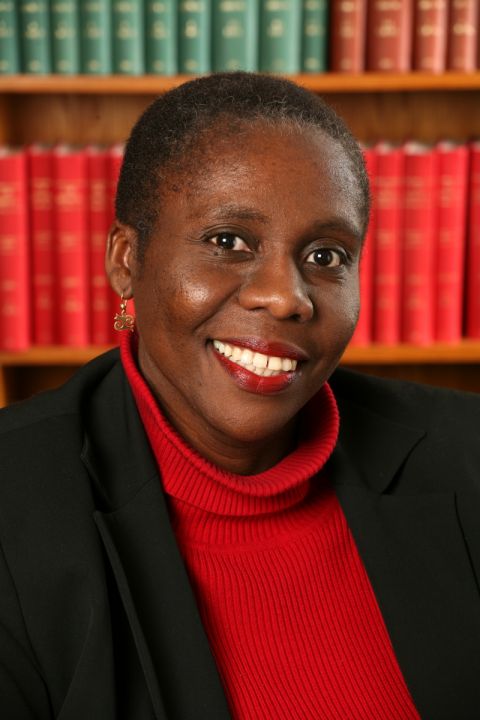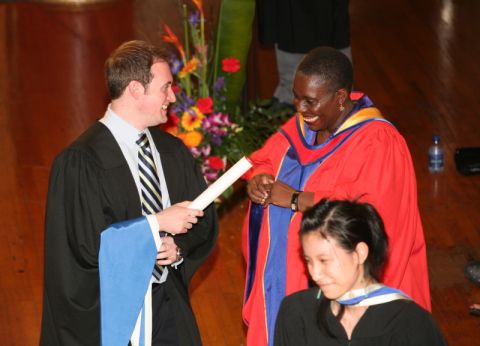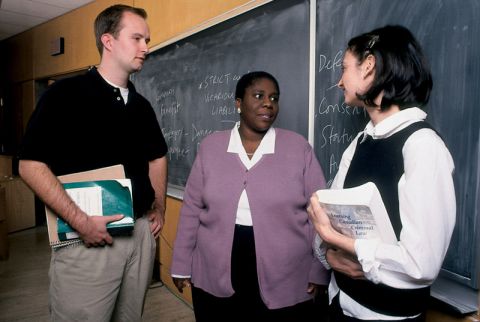


The Queen’s Law community is remembering Rosemary Ofei-Aboagye King, LLM’92, a beloved professor, an influential scholar, and a trailblazer in education equity. She died in Kingston on July 6 at the age of 57.
After earning her LLB from the University of Ghana and spending a year there as a teacher and researcher, King arrived at Queen’s in 1990 to begin her Master of Laws studies. Her thesis supervisor, Toni Pickard (now a retired faculty member), recalls how King’s topic on addressing domestic violence in Ghana presented an unusual challenge: “At the time, domestic violence was not seen as a problem in Ghana; criminalizing it was nowhere on the horizon.” In addition, King’s critical stance toward her own culture provoked criticism and sometimes hostility from Ghanian friends and colleagues. “But no matter how daunting the project, how conflicted she felt, how hurt by the anger she aroused, Rosemary faced it all with an open mind, determination, and courage,” says Pickard.
King’s hard work and determination paid off. “The resulting thesis (which had taken Rosemary into then-novel areas of study, such as feminist analysis and cultural studies) was creative and significant,” adds Pickard. “Together with a few sequel articles she published, that early work inspired many cross-cultural, feminist, and legal scholars to focus on violence against women in Ghana, Nigeria, Botswana, and elsewhere.”
A newly minted LLM graduate in 1992, King was appointed Director of the Education Equity Program at Queen’s Law, a new position that was the first of its kind in a Canadian law school.
While the program was designed primarily to meet the needs of people entering law school through the equity mandate, it provided support to all students. The program that she began – and that has continued to evolve and thrive over the years – included academic, tutorial, language and personal support, guidance and information, personal counselling, and other assistance.
For her first two years on the job, she was also a scholar-in-residence at the school while earning her Doctor of Jurisprudence degree from Osgoode (she completed her doctoral thesis, “Ghanaian Women: Equality & Empowerment,” under the supervision of Mary Jane Mossman, Law’70). Then, she was then appointed an adjunct assistant professor at Queen’s, where for over a decade, she flourished in her dual administrative and academic roles.
“Rosemary was a transformative figure both at Queen’s Law as well as in the broader legal academic community,” says Dean Mark Walters, Law’89. “She developed an approach to equity and student support that was innovative and continues to shape the law school community. She was admired for her legal scholarship – for her ability to approach deep social problems through a lens that combined critical and feminist theory with a comparative approach that saw links between countries and legal traditions.”
According to Professor Kathleen Lahey, the best tribute to how King’s work and life have shaped how to focus on the future may be found in her “groundbreaking” paper, “Altering the strands of the fabric: A preliminary look at domestic violence in Ghana,” published in SIGNS: Journal of Women in Culture and Society in 1994.
Calling King’s scholarly acumen “outstanding,” Professor Beverley Baines, Law’73, knows of no other Canadian legal feminist scholar before her to have published an article in this prestigious American feminist journal. “Rosemary received much merited academic accolades for this article and for other work that she did for women in Ghana and based on this work for women globally,” says Baines.
One passage of that paper is what Lahey and others say captures the essence of what King did in her scholarship and in life: “She always wanted to get the things that hurt people and life out of the way, to make way for the bright green shoots of grass that are our futures,” says Lahey. That section reads:
Growth. Germs of ideas, buds of awareness begin to grow. Small, fragile plants, some sickly yellow, others a striking green. I would not let the sickly yellow buds develop – the fear that the work about to be done was a ‘flight of fancy’ and not ‘law,’ the criticism that I was trying to incorporate what was essentially a Western phenomenon into the Ghanaian culture...But the strong green buds, those were the changes in me: looking at social conditioning from a different perspective, replaying and observing old cultural patterns with new insight. The time was right for me to address domestic violence issues in Ghana.
Taking up what King began in relation to Ghana, Cynthia Grant Bowman re-published the article in “Transnational feminism in the context of intimate partner violence in Ghana” (Cornell International Law Journal, 2019). “Rosemary kept inspiring those who would address inequalities from profoundly transformative perspectives by showing how to make constructive changes through engagement in change-making at all levels – beginning with the meaning of life and of taking responsibility for all our futures in all we do,” says Lahey.
King’s work appeared in such academic publications as the Journal of Women in Culture and Society, the Columbia Journal of Gender and Law, and the Human Rights Review.
Professor Nick Bala, Law’77, appreciated King’s excellent judgment about people and situations, and how she maintained her sense of humour even in very difficult situations. “The fact that she was a Black woman law professor in Canada in the early 1990s created special challenges,” he recalls. “She faced discrimination with courage, strength and grace, and showed compassion and kindness to students from all races and backgrounds. Rosemary was beloved by her students, who appreciated her knowledge, wisdom, judgement, and warmth.”
One of those students was Shuchanna Swaby, Law’96, now a lawyer in Cambridge, Ont. “For many of us, Rosemary was more than an excellent law professor and legal scholar,” says Swaby. “She was a friend, confidante, and mentor to everyone. She spoke to us about the law and helped us navigate some of the most challenging years of our lives. She was there for anyone who needed a shoulder to lean on, wisdom to rely upon, direction to help us find our place in the world and someone to laugh with.”
In the classroom, King taught Torts, Contracts, and Health Law. Former student Bronagh Morgan, Law’99, now a legal researcher, writer, and talk-show host in London, Ont., recalls, “Rosemary taught in a way that made everyone understand what she was talking about. She made complicated ideas accessible. She was creative and fun.”
Outside the classroom, King was known for preparing memorable feasts. Baljinder Girn, Law’97, now Senior Crown Counsel with the Public Prosecution Service of Canada, recalls, “Rosemary was one of the kindest professors I had. She invited a few of us to her home and served us a wonderful dinner of traditional Ghanaian food. As a woman of color, it was so comforting to be able to speak to someone who looked like me.”
King was the fifth LLM student to come to Queen’s from Ghana and she supervised a number of the 19 who followed. The first was Charlotte Kesson-Smith Osei, LLM’96. “Prior to my arrival at Queen’s, all the faculty in Ghana had told me about Rosemary; they were all incredibly proud of her,” Osei recalls. “She pushed me to the limits of my abilities and it was clear that she only wanted the best for me. She remained a great pillar of support in a much-loved big sister way beyond my Queen’s days.”
As Dean Walters puts it: “Whether through her dedication to academic guidance and support, ardent pursuit of equity within legal education, or her passion for helping others succeed, Rosemary King provided an inspiring example of what a colleague should be within an academic community. All who knew Rosemary, would agree that her contributions to Queen’s Law were truly significant. While she will be greatly missed, her legacy and contributions will live on.”
Learn about the Education and Equity Services Office at Queen’s Law today.
By Lisa Graham